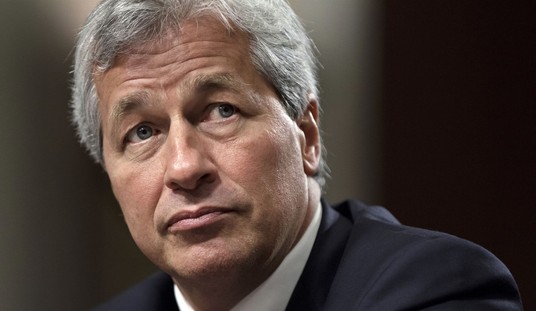
When last we encountered Julia Ioffe, she was getting punted from Politico because she maliciously and falsely claimed that President Trump was engaged in incest with Ivanka Trump.

Little did we know that slander, which could get you fired in 2016, could get you a Pulitzer Prize in just a couple of years, but that is a different story. I’m only using this introduction of Ioffe to underscore the fact that she’s not a well person. So it wasn’t entirely out of character when she complained that a political party that is heavily influenced by Evangelical Protestants and Traditional Roman Catholics had speakers who mentioned Jesus Christ rather than global warming.
Don't mind me, just a Jewish citizen of America who is more than a little uncomfortable with all the Jesus content at the #RepublicanNationalConvention. I'm sure it's not on purpose.
— Julia Ioffe (@juliaioffe) August 27, 2020
I’ll elide past the fact that on the night that Ioffe made this complaint, the invocation was made by orthodox Rabbi Aryeh Spero and say, flat out, that I really don’t care that she was uncomfortable. I’d go so far as to opine that perhaps someone so given over to casual slander for political gain being made uncomfortable by the mention of the Messiah is probably a good thing.
The use of “tolerance” or whatever to silence observant Christians has nearly become a national pastime. The whole nonsense about “separation of church and state” is merely a tool used by people, some of them might even be well-meaning, to demand the public rhetoric and policy be divorced from Christianity because we are a pluralistic society.
Having sat through the entire convention, gavel-to-gavel, it is evident that Ioffe isn’t offended by any official endorsement of Christianity, because there really wasn’t one. She is upset that people addressing the convention expressed how their faith helped them at critical times. This attempt to use her personal discomfort with Christianity as a way of silencing others is nothing new. A couple of years ago, she had a minor fit in the opinion pages of the Washington Post over being wished Merry Christmas by strangers:
…Despite the movies and the shopping, despite the Germanic decor, Christmas is still, at its core and by design, about the birth of Christ, a point that seems bizarre to argue. Just look at all those nativity scenes! And we don’t observe the holiday on just any day. Dec. 25 has Christian significance. Whenever I hear the name, I hear the “Christ” in it. To me, it’s strange that many of its celebrants do not.
And despite its celebration of a Christian god, it is everywhere, for over a month, in a way no other holiday is — not even Easter. It is in every ad, in every window and doorway, and on everyone’s lips. If you’re not a part of the festivities, even its sparkling aesthetic can wear you down. When you are from a minority religion, you’re used to the fact that cabdrivers don’t wish you an easy fast on Yom Kippur. But it’s harder to get used to the oppressive ubiquity of a holiday like Christmas. “This is always the time of year I feel most excluded from society,” one Jewish friend told me. Another told me it made him feel “un-American.”
To say it’s off-putting to be wished a merry holiday you don’t celebrate — like someone randomly wishing you a happy birthday when the actual date is months away — is not to say you hate Christmas. It is simply to say that, to me, Julia Ioffe, it is alienating and weird, even though I know that is not intended. I respond: “Thanks. You, too.” But that feels alienating and weird, too, because now I’m pretending to celebrate Christmas. It feels like I’ve verbally tripped, as when I reply “You, too!” to the airport employee wishing me a good flight. There’s nothing evil or mean-spirited about any of it; it’s just ill-fitting and uncomfortable. And that’s when it happens once. When it happens several times a day for a month, and is amplified by the audiovisual Christmas blanketing, it’s exhausting and isolating. It makes me feel like a stranger in my own land.
As an aside, I was struck by the implication here that either wishing Merry Christmas be forbidden or that non-Christians wear some kind of identifying device to alert people to not offend them.
No one should think that she’s acting in good faith. She’s merely using the overt expression of faith on the part of convention speakers and on the part of many conservative Republicans as a proxy for accusing them of being intolerant bigots. What she’d attempting to do is change the idea of religious tolerance from you being able to practice your faith openly without the state interfering to outlawing any public expression of faith that offends someone. That is simply bigotry.
Most of America is religious. I would contend that the rise of the “nones,” that is, people who don’t believe in anything, is more of a factor of kids being raised in homes devoid of religious influence than any rejection of religion, per se. And the dominant religion in America is Christianity. Even though Christianity is imperfectly understood by a growing number of self-identified Christians:
A new survey conducted by LifeWay Research and released by Ligonier Ministries revealed that 52% of Americans and 30% of evangelicals say they believe that Jesus was a “good teacher, but he was not God.”
that identity exists nonetheless.
This is not to say Ioffe is alone. David French and Sohrab Ahmari have been having this debate. French is of the belief that Christianity is a personal enterprise that should not inform public policy, hence his description of the vile state-sanctioned sexual grooming of pre-adolescent children in the guise of “Drag Queen Story Hour” as “a blessing of liberty.” (Read a decent write up of the debate, I’m not totally with Ahmari but I’m much closer to him that to the pale, emasculated, flaccid role for faith in the public square than that pushed by French.) And, ultimately, a supposed good faith effort by French’s acolytes to never offend anyone about anything is really no different than Ioffe’s attempt to equate open expression of Christianity with bigotry.
In the words of John Adams, “Our Constitution was made only for a moral and religious people. It is wholly inadequate to the government of any other.” We were founded by Christian people based upon Christian concepts. If you are offended by that or by the mention of Jesus Christ, you probably aren’t really American to begin with.













Join the conversation as a VIP Member